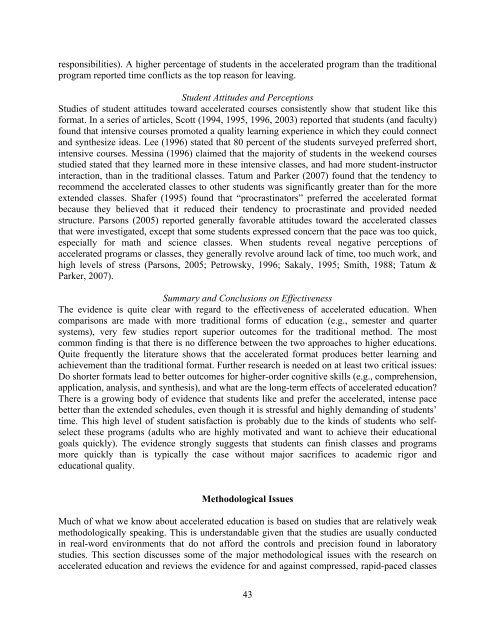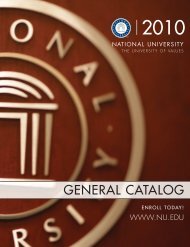Journal of Research in Innovative Teaching - National University
Journal of Research in Innovative Teaching - National University
Journal of Research in Innovative Teaching - National University
Create successful ePaper yourself
Turn your PDF publications into a flip-book with our unique Google optimized e-Paper software.
esponsibilities). A higher percentage <strong>of</strong> students <strong>in</strong> the accelerated program than the traditional<br />
program reported time conflicts as the top reason for leav<strong>in</strong>g.<br />
Student Attitudes and Perceptions<br />
Studies <strong>of</strong> student attitudes toward accelerated courses consistently show that student like this<br />
format. In a series <strong>of</strong> articles, Scott (1994, 1995, 1996, 2003) reported that students (and faculty)<br />
found that <strong>in</strong>tensive courses promoted a quality learn<strong>in</strong>g experience <strong>in</strong> which they could connect<br />
and synthesize ideas. Lee (1996) stated that 80 percent <strong>of</strong> the students surveyed preferred short,<br />
<strong>in</strong>tensive courses. Mess<strong>in</strong>a (1996) claimed that the majority <strong>of</strong> students <strong>in</strong> the weekend courses<br />
studied stated that they learned more <strong>in</strong> these <strong>in</strong>tensive classes, and had more student-<strong>in</strong>structor<br />
<strong>in</strong>teraction, than <strong>in</strong> the traditional classes. Tatum and Parker (2007) found that the tendency to<br />
recommend the accelerated classes to other students was significantly greater than for the more<br />
extended classes. Shafer (1995) found that “procrast<strong>in</strong>ators” preferred the accelerated format<br />
because they believed that it reduced their tendency to procrast<strong>in</strong>ate and provided needed<br />
structure. Parsons (2005) reported generally favorable attitudes toward the accelerated classes<br />
that were <strong>in</strong>vestigated, except that some students expressed concern that the pace was too quick,<br />
especially for math and science classes. When students reveal negative perceptions <strong>of</strong><br />
accelerated programs or classes, they generally revolve around lack <strong>of</strong> time, too much work, and<br />
high levels <strong>of</strong> stress (Parsons, 2005; Petrowsky, 1996; Sakaly, 1995; Smith, 1988; Tatum &<br />
Parker, 2007).<br />
Summary and Conclusions on Effectiveness<br />
The evidence is quite clear with regard to the effectiveness <strong>of</strong> accelerated education. When<br />
comparisons are made with more traditional forms <strong>of</strong> education (e.g., semester and quarter<br />
systems), very few studies report superior outcomes for the traditional method. The most<br />
common f<strong>in</strong>d<strong>in</strong>g is that there is no difference between the two approaches to higher educations.<br />
Quite frequently the literature shows that the accelerated format produces better learn<strong>in</strong>g and<br />
achievement than the traditional format. Further research is needed on at least two critical issues:<br />
Do shorter formats lead to better outcomes for higher-order cognitive skills (e.g., comprehension,<br />
application, analysis, and synthesis), and what are the long-term effects <strong>of</strong> accelerated education<br />
There is a grow<strong>in</strong>g body <strong>of</strong> evidence that students like and prefer the accelerated, <strong>in</strong>tense pace<br />
better than the extended schedules, even though it is stressful and highly demand<strong>in</strong>g <strong>of</strong> students’<br />
time. This high level <strong>of</strong> student satisfaction is probably due to the k<strong>in</strong>ds <strong>of</strong> students who selfselect<br />
these programs (adults who are highly motivated and want to achieve their educational<br />
goals quickly). The evidence strongly suggests that students can f<strong>in</strong>ish classes and programs<br />
more quickly than is typically the case without major sacrifices to academic rigor and<br />
educational quality.<br />
Methodological Issues<br />
Much <strong>of</strong> what we know about accelerated education is based on studies that are relatively weak<br />
methodologically speak<strong>in</strong>g. This is understandable given that the studies are usually conducted<br />
<strong>in</strong> real-word environments that do not afford the controls and precision found <strong>in</strong> laboratory<br />
studies. This section discusses some <strong>of</strong> the major methodological issues with the research on<br />
accelerated education and reviews the evidence for and aga<strong>in</strong>st compressed, rapid-paced classes<br />
43

















